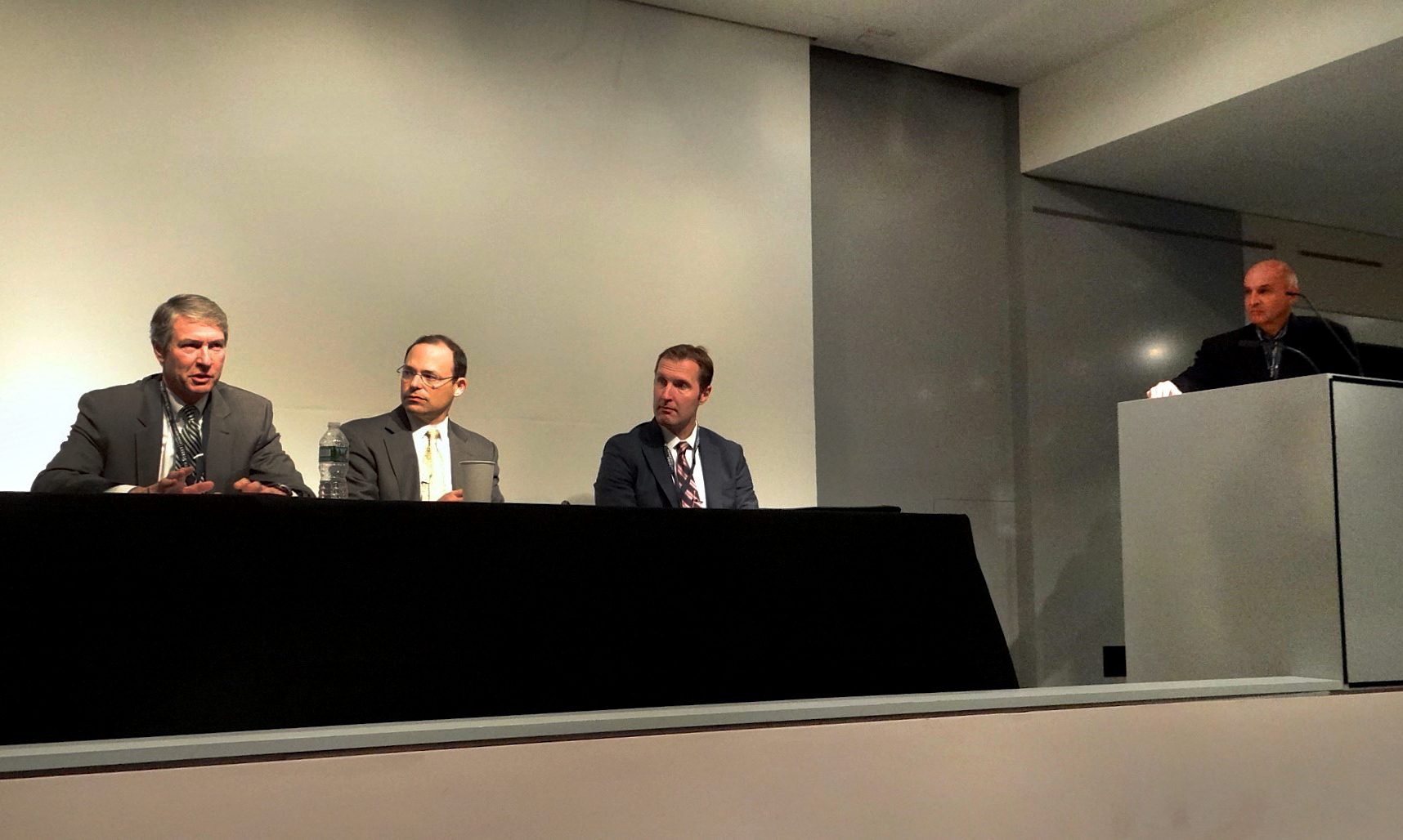
FAIRFIELD, Conn.—Two Sacred Heart University professors had the distinction of representing SHU at this year’s Global Alpha Forum investment conference in Stamford. Mark Ritter, executive-in-residence at SHU’s Welch College of Business (WCOB), and Lucjan Orlowski, professor of economics, each had significant roles at the forum, for which the University was a gold sponsor.
The engagement served as an excellent way for SHU to highlight its doctorate of business administration and finance programs, as well as the WCOB as a whole.
The forum—formerly known as the World Hedge Fund Forum— is the biggest conference of its kind, bringing together members of the alternative investment industry, academia and government to discuss where the sector is moving and review the latest trends. Speakers addressed opportunities covering hedge funds, liquid alternative investments, price/earnings ratios, venture capital and real estate.
Ritter moderated the opening panel, “Managing Regulatory Risk: What Happens When the SEC Calls?” The panel included Bruce Rogers, regional insurance executive for First Niagara Risk Management; Carl Metzger, partner at Goodwin Procter law firm; and Chris Ray, senior principal consultant at ACA Compliance Group.
Ray opened to note that the appointment in 2013 of Mary Jo White, chair of the U.S. Securities and Exchange Commission (SEC), ushered in an “aggressive administration,” wherein even the smallest missteps are considered indicative of potentially bigger problems. Last year alone, the SEC filed 807 enforcement actions, he said.
He also noted that the SEC has encouraged whistleblowing within firms and has been offering compensation to individuals reporting issues that resulted in successful regulatory actions. In fact, Ray said, the SEC has received 14,000 such calls since 2011.
Metzger agreed there has been a definite “shift in the landscape” of investments, and Rogers confirmed that the SEC’s stricter regulatory approach has had a huge impact on the insurance sector, driving the industry’s claims investigations.
The panel suggested that, while whistleblowing might seem to be a good idea on paper, it can be “problematic,” as Metzger termed it, with disgruntled employees often doing the reporting.
Ritter suggested that there may also be a correlation between “whistleblowing” and the overall strength of the economy.
The panel advised getting out in front of matters before the SEC comes calling, though self-monitoring “puts a lot of strain on internal audit groups,” Ray said. Metzger advised making sure protocols and protections are in place to start with, though the costs of investigations can be substantial. Insurance protections are a good first line of defense, he said.
The group said the SEC may not be the only group that steps in when investments arouse suspicions—other federal, state and local agencies may investigate, and in certain instances, have competed with each other. Furthermore, one of the first areas they review is the e-mail of a company’s senior executives. “People need to be well-trained with regard to their electronic communications,” said Metzger.
Orlowski’s talk, “Recent Risks Facing Global Financial Markets,” immediately followed the opening panel. Supported by graphs and statistics, he said deflation risks threaten the global markets, due to increasing life expectancy, low energy prices, energy-saving technology and vast excess reserves of the U.S. banking sector. Inflationary pressures are also a factor, he said, including enormous liquidity injections through federal quantitative easing (an economic stimulus policy), low or negative interest rates, declining labor and capital productivity and rising unit labor costs.
Breaking out market risks further, Orlowski noted that aging societies display an increasing propensity to save and decreasing desire to invest, causing slower economic growth and inflation. Public debt levels restrain the potential for fiscal expansion, he said, and political risks are affecting the markets as well, with ambiguity and uncertainty about economic strategies and policies in the U.S., at least until Election Day.
Other risks Orlowski outlined included: the uncertain fallout of Great Britain’s exit from the European Union; renewed sovereign risk, such as the slow progress of reforms in Greece; and China’s exorbitant private debt.
Orlowski suggested a solution for the U.S.: “A reasonable fiscal stimulus based on exhaustive government spending and tax cuts can significantly increase taxable income and reduce the debt burden,” he said.
PHOTO CAPTION: Jack Welch College of Business Executive-in-Residence Mark Ritter moderates a panel, including Bruce Rogers, Carl Metzger and Chris Ray, about managing regulatory risk at the Global Alpha Forum in Stamford on October 6. (For Sacred Heart University - Mike Lauterborn)